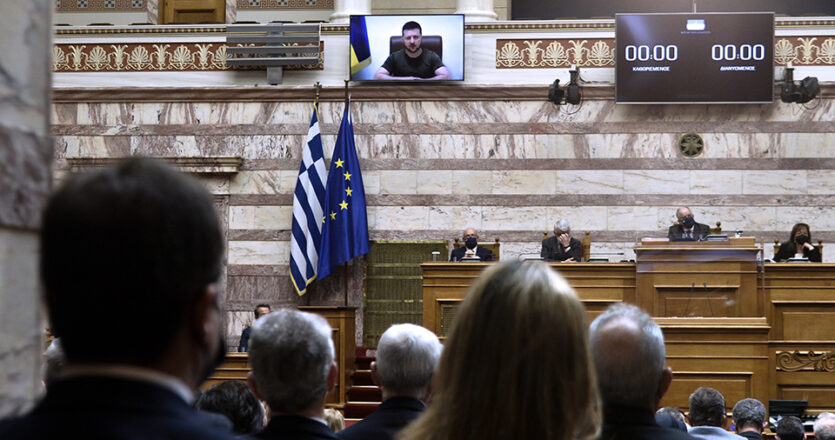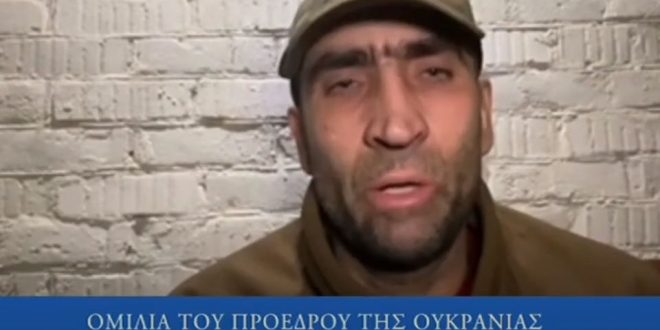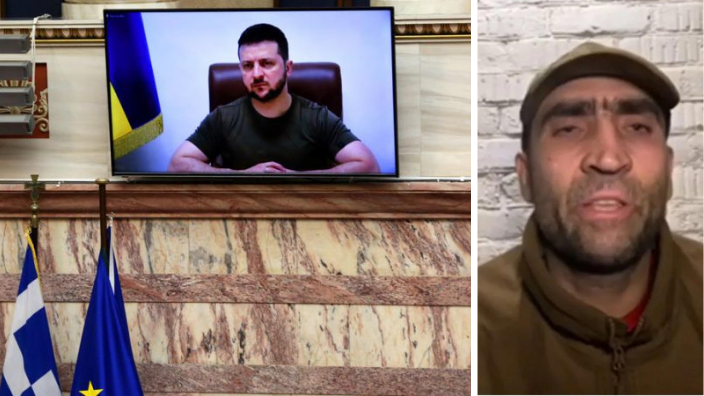Ukrainian President, Volodymyr Zelenskyy, called on Greece on Thursday to use its influence in the European Union to help save “our shared heritage” in the besieged Ukrainian port city of Mariupol.
Addressing the Greek Parliament via teleconference, Zelenskyy said Mariupol, where thousands of ethnic Greeks live, had been “reduced to ashes” since Russia’s invasion, and called for more humanitarian aid and efforts to evacuate those wounded.
“The suffering in both the Greek and Ukrainian communities is great from the barbarity against the civilian population,” Zelenskyy told lawmakers via an interpreter.
“This is a matter of honour for Europeans to answer.”
In a nod to the Greek links of Mariupol, Zelenskyy then invoked the Greek revolutionary motto ‘Freedom or Death’ and said it applies to his country today as Ukrainians are also fighting against Russian aggression for their freedom.
He also mentioned the Filiki Etaireia, an underground organisation founded in Odessa that set the foundations for the Greek Revolution and the creation of the modern Greek state.
“I call on you now openly to create such a union of friends which will be able to save Ukrainians and Greeks in the south of Ukraine,” he said.
READ MORE: Ukraine’s President thanks Greek FM for offering to lead humanitarian aid mission.

Zelenskyy concluded his speech by thanking Greece for the sanctions it imposed on Russia. He also pleaded for more weapons to defend Ukraine against the Russian invasion.
Lawmakers from the biggest parties, ruling New Democracy (EPP), Syriza (EU Left) and socialists (Pasok) attended Zelenskyy’s speech, while communists and the populist Greek Solution party abstained. Diem25, Yiannis Varoufakis’ leftist party, was represented by just one lawmaker.
READ MORE: Communist Party to skip Ukrainian President’s speech in Greek Parliament.
Azov soldier during Zelenskyy’s address triggers outrage:
Zelenskyy received a standing ovation at the conclusion of his speech to Greek Parliament, but it was overshadowed by a video message from the far-right militia group, the Azov Battalion, which was broadcast to Greek lawmakers afterwards.

“I was born in Mariupol, and I take part in the defence of the city from the Russian Nazis,” the Azov fighter said in the video.
“I will not talk about the difficulties we have in defence, participating through the Azov Battalion. This is my debt to my city, my debt as a man and I must talk about the catastrophic conditions in which the Greek Mariupol is experiencing.”
In response, Opposition Party leader Alexis Tsipras came out swinging on social media saying “the speech of members of the neo-Nazi Azov Battalion in the Greek Parliament is a provocation.”
“The absolute responsibility lies with the Prime Minister Kyriakos Mitsotakis. He talked about a historic day, but it is a historic shame. The solidarity with the Ukrainian people is a given. But the Nazis cannot have a say in Parliament,” Tsipras said.
Similarly, former Prime Minister Antonis Samaras said allowing the video to be broadcast in the Greek House was a “big mistake.”
Greece’s Prime Minister, Kyriakos Mitsotakis, issued a statement in response which said: “Europe is called upon to immediately put out the fire of war that ignited in its heart the Russian regime. The heinous crimes that were committed should be punished.”
Meanwhile, government spokesperson Giannis Oikonomou said the inclusion of the Azov Battalion message was “incorrect and inappropriate.”
Source: Euroactiv.

